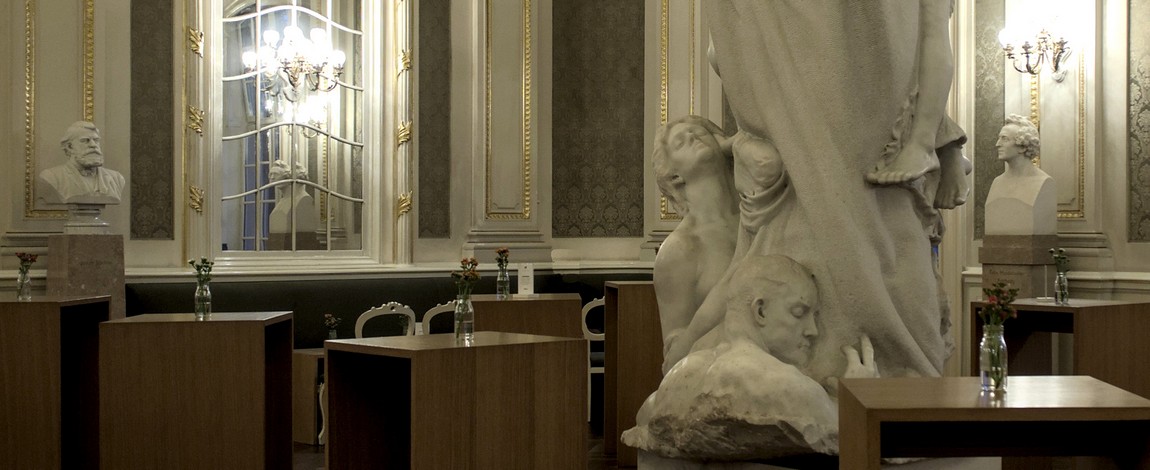
If you are planning a city break in Hamburg and feel like going to a concert, you will surely think of Elbphilharmonie, an auditorium that I love. However, you will notice that the Laeiszhalle, the old concert hall in the city, still offers a part of the programme. If you ever attend a concert at this venue, you should go to the foyer: you will find it presided over by a sculpture by Johannes Brahms, accompanied by busts of numerous musicians (in the photograph that illustrates this article, you can see that of the violinist Joseph Joachim and that of Felix Mendelssohn).
The marble statue of Brahms was placed in the foyer in 1909, the year following the inauguration of the Neo-Baroque building. It is a work by Max Klinger, a renowned artist of the time who had a good relationship with the composer. Brahms dedicated the Vier ernste Gesänge to him to thank him for his Brahmsphantasies, a collection of notebooks with illustrations that accompany his works. And I would say that the sculpture conveys the admiration Klinger had for Brahms.
The composer appears surrounded by four figures that embrace him. One embraces him by the neck, hanging from his back, as a child would do; their faces are together and Brahms holds it by the arm. There are two women embracing him on his legs (the photography has one hidden because of the perspective), and a mature man embracing him on his feet. Among the memorials I know dedicated to musicians, this one is my favourite. Perhaps it is because, at times, while listening to Brahms' music, I would also embrace him.
I wouldn't say that Brahms had the gift of the melody. His works contain magnificent melodies, of course, but let's say he did not have Schubert's gift. However, I think he had a gift of opportunity when it came to making a wonderful and moving melody appear, sometimes just a couple of sentences, in the middle of a piece. If we mention songs, I mean the melody we hear in Feldeinsamkeit's third verse or O Tod, wie bitter bist du's second stanza. Or Mondenschein, this week's song. And when I listen to those melodies at the right, needed moment, I would embrace Brahms with respect and gratitude.
Mondenschein's poem [Moonlight] belongs to Heinrich Heine's Buch der Lieder; is the 86th poem of Die Heimkehr, the immediately preceding Die Tod das is die kühle Nacht, also set to music by Brahms. The two stanzas tell us of someone who is sad and tired, and how the light of the moon relieves their suffering. The composer reorders the two stanzas musically, resulting in the Lied having three parts. The first begins directly with the voice, without any introduction of the piano. It comprises the first two verses of the poem, and reflects the tired pace of a wanderer; the repetition of the second verse insists on the suffering of the poetic voice. And then, when the light of the moon arrives, the melody also arrives. The next four verses speak of consolation, which is exactly what music tells us. The last two verses also introduce new music, a beautiful coda in which pain dissolves.
Brahms composed Mondeschein in May 1878, and it was published it in 1882; it is the second lied of Opus 85. There's another thing I wanted to tell you about this song and this Opus, but we'll leave it for next week. For now, we'll listen to it in a wonderful version, the one Dietrich Fischer-Dieskau and Hertha Klust recorded in 1952. The baritone later recorded it (at least) twice more, but in my opinion, neither of the two improved this one, recorded at his 27. So I hope you will apologize for the poor quality of the sound, and Klust's piano in the background, and enjoy the beauty of Mondenschein.
Nacht liegt auf den fremden Wegen, –
Krankes Herz und müde Glieder; –
Ach, da fließt, wie stiller Segen,
Süßer Mond, dein Licht hernieder.
Süßer Mond, mit deinen Strahlen
Scheuchest du das nächt’ge Grauen;
Es zerrinnen meine Qualen,
Und die Augen überthauen.
Night lies on the unfamiliar roads;
a sick heart and tired limbs...
ah, like a quiet blessing, there flows down,
sweet moon, your light;
Sweet moon, with your rays
You drive away the night horror;
Away runs my pain,
And my eyes brim over with tears.
(translation by Emily Ezust)















Comments powered by CComment